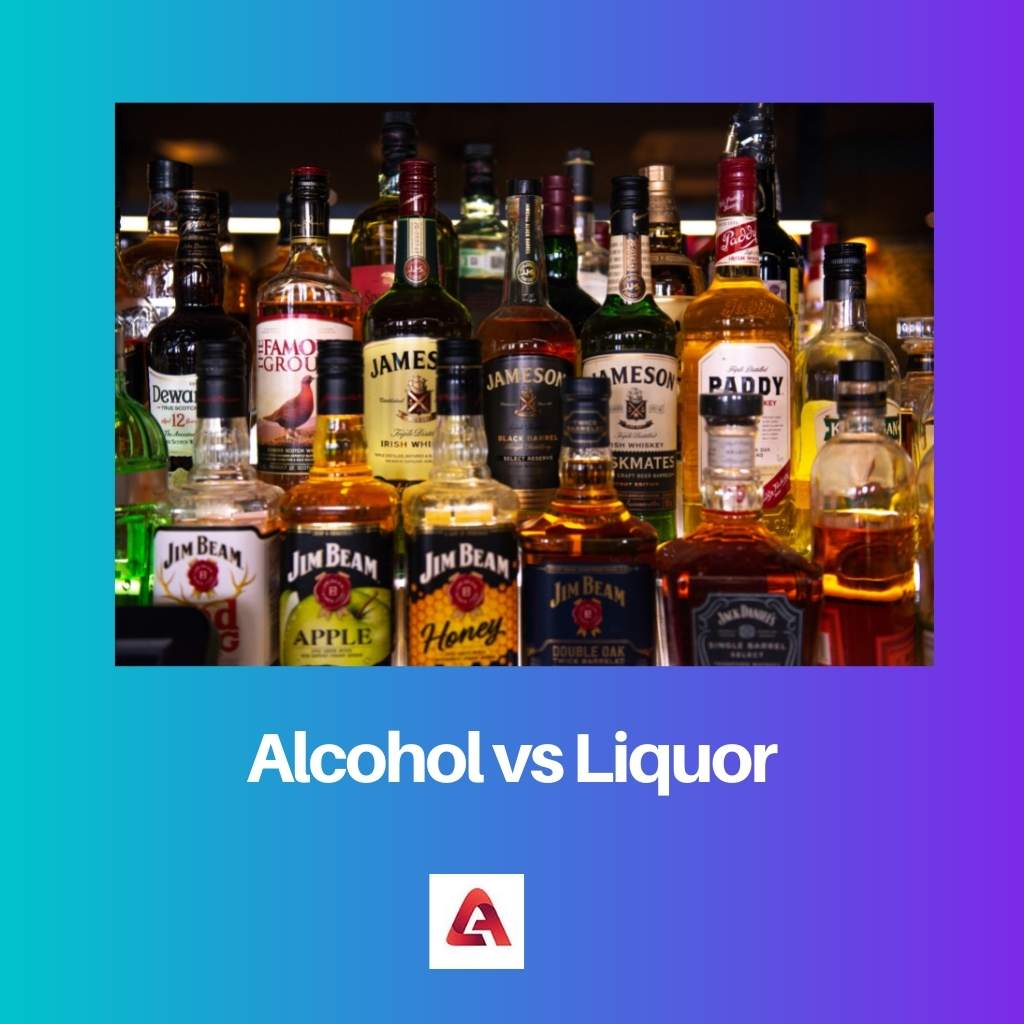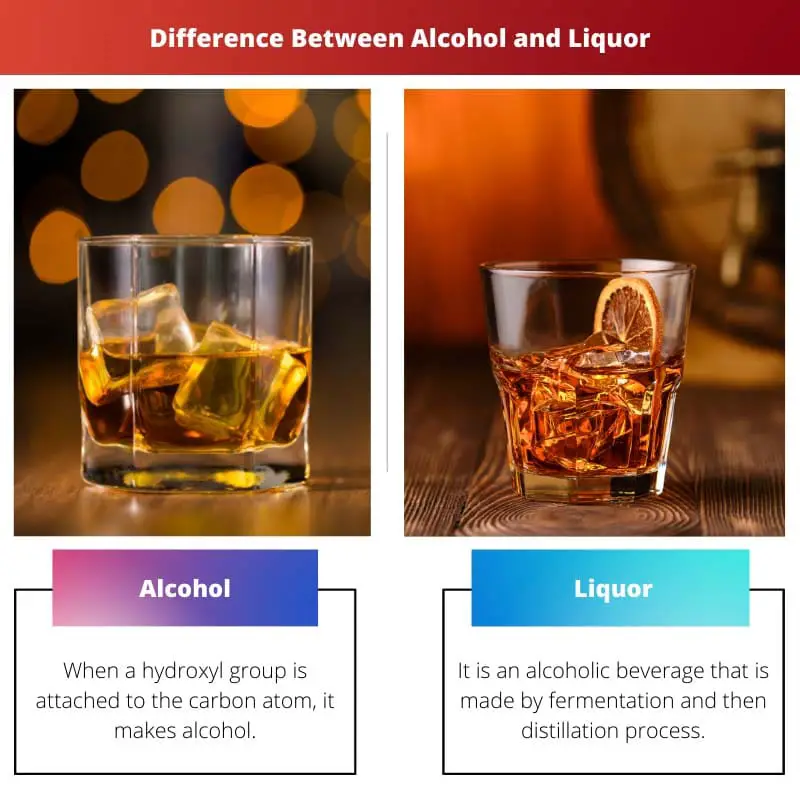Alcoholic beverages have been very popular in the human context. Consuming them can be traced back to 10,000 BC or even earlier. However, there is no concrete evidence that human beings used to ferment drinks from fruits, vegetables and grains in vessels.
The evidence of consuming and making alcoholic beverages is a part of the oldest civilization of China, as old as around 7000 BC.
Consuming alcoholic beverages was very common in social functions, events, and religious, spiritual and traditional practices as well. It was considered a common practice in any religion and culture of the globe.
Soon and gradually, the distillation process emerged, which led to the production of liquors. Thus, the differences between liquor and alcohol become crystal clear.
Key Takeaways
- Alcohol is a broad term that refers to any drink that contains ethanol.
- Liquor, however, refers explicitly to distilled alcoholic beverages with high alcohol content.
- While alcohol can be fermented from various sources like fruits, grains, or honey, liquor is made by distilling fermented grains or fruits.
Alcohol vs Liquor
Alcohol is a chemical compound that contains an -OH group, also known as the hydroxyl group and is a broad term that refers to any organic compound that contains this functional group. Liquor is a type of alcohol that is distilled from grains, fruits, or vegetables and has a higher alcohol content.

Alcohol belongs to a family of organic compounds. When a hydroxyl or -OH group is bonded with the carbon atom, it makes alcohol. The process of fermentation and chemical reaction prepares these.
Various components of alcohol comprise methanol, propanol, ethanol and so on. Not all types of alcohol are fit for consumption. The ethanol content in alcohol is comparatively low than in other beverages.
Liquor can be categorised as a type of alcoholic beverage. It is an alcoholic beverage that is prepared by the process of distillation. The main ingredient which constitutes liquor is ethanol.
However, all types of liquor available and marketed are fit for consumption. They include rum, brandy, vodka, whisky, etc. The percentage of ethanol present in liquor is high and higher than in alcohol also.
Comparison Table
| Parameters of Comparison | Alcohol | Liquor |
|---|---|---|
| Type | A type of organic compound. | A type of alcoholic beverage. |
| Definition | When a hydroxyl group is attached to the carbon atom, it makes alcohol. | It is an alcoholic beverage that is made by fermentation and then distillation process. |
| Preparation process | Fermentation or chemical reaction. | Distillation. |
| Components | Ethanol, methanol, propanol and so on. | It mainly consists of Ethanol. |
| Consumption | Not all are safe for consumption purposes. | Safe for consumption. |
| Ethanol content | The presence of ethanol is low. | The presence of ethanol is high. |
What is Alcohol?
The main characteristic of an alcoholic family is that there is a presence of a hydroxyl group. The Hydroxyl group is a –OH functional group. The simplest known alcohol that belongs to the family of alcohols is methyl alcohol.
Commonly and popularly, it is also called methanol. The hydroxyl group attaches to the sp3 hybridised carbon atom.
Alcohols can be classified into three groups. They are primary alcohol, secondary alcohol and tertiary alcohol. The classification of alcohol depends upon the degree of the substituted carbon, which is directly attached to the hydroxyl group.
If the carbon to which the hydroxyl group is attached is bonded with no other carbon atoms, it is a primary alcohol. If the hydroxyl-bonded carbon atom is attached to two other carbon atoms, it makes secondary alcohol and so on.
According to the nomenclature suggested by IUPAC, the name of the alcohols are kept with a suffix -of. Alcohols are known to possess hi boiling points than that of the corresponding hydrocarbons.
The reason is due to the presence of interaction between the molecules of alcohol via hydrogen bonding. Moreover, alcohols are polar. They are weak acids as well.

What is Liquor?
With the process of distillation of alcohol, an alcoholic beverage can be produced, which is called Liquor.
Liquor is a very strong beverage that contains ethanol as its main ingredient. When the high in sugar-containing materials get fermented by yeast-like anaerobic bacteria, they produce liquors.
Those materials which can be used for fermentation are fruits, vegetables, grain, sugarcane, etc. In the process of fermentation, the conversion of sugars into ethanol occurs. The content produced is further distilled.
As alcohol has a comparatively low boiling point than water, the alcohol evaporates quickly and then can be collected from the condensed water vapour in the form of liquor.
Liquor can be measured according to the volume of alcohol content they have. Some examples of liquor beverages are rum, brandy, whisky and vodka. They are also called “spirits”.

Main Differences Between Alcohol and Liquor
- Alcohol is a type of organic compound. On the other hand, liquor is a type of alcoholic beverage.
- When a hydroxide group is bonded with the carbon atom, it produces alcohol. However, liquor is an alcoholic beverage made by fermentation and then distillation.
- The process makes alcohols of fermentation or chemical reaction. In contrast, the process of distillation prepares liquors.
- Various components of alcohol include ethanol, methanol, propanol, etc. However, Liquor mainly consists of Ethanol only.
- Not all by-products of alcohol are safe for consumption purposes. On the other hand, Liquor contains beverages that are safe for consumption.
- The ethanol content in alcohol is low. On the other hand, the ethanol content in liquor is much higher than in alcohol.


This article is full of fascinating historical and scientific details. I’m thoroughly enjoying it.
The detailed explanations of the science of alcohol and liquor production in this article is truly top-notch. I’m thoroughly impressed.
This article is a wealth of knowledge. I’m thoroughly enjoying the information provided here.
I’m learning so much from this article. The comparisons and historical context are incredibly interesting.
The detailed comparison between alcohol and liquor has been very enlightening. I’m thoroughly enjoying this article.
The historical context provided about alcoholic beverages is truly fascinating.
I’m finding the explanations about alcohol and liquor to be very informative and enjoyable to read.
I’m learning so much about the detailed processes involved in producing liquor. It’s an eye-opening article.
I’m impressed by the comprehensive nature of this article. The breakdown of alcohol and liquor production is fantastic.
I appreciate the detailed explanations of alcohol and liquor. It’s always great to learn about the science behind these drinks.
I never knew so much went into the production of liquor. The historical context is also very interesting.
Agreed, the science of alcohol and liquor production is very intriguing.
I’m very impressed by the depth and clarity of this article. It’s shedding light on so many interesting aspects of alcoholic beverages.
I completely agree. The science and history discussed here is captivating.
Incredible article! I love learning about the history and processes behind alcoholic beverages. Very informative.
I’m learning so much from this article. The distinction between alcohol and liquor is fascinating.
I completely agree. This article has so much interesting information.
The comparison between alcohol and liquor is very well-detailed. It’s helping me better understand the differences between the two.
I agree, the comparison table is very helpful.
I’m finding the information about the production of liquor to be particularly intriguing and educational.
This article is providing valuable insight into the history and science of alcoholic beverages. It’s a fascinating read.
Absolutely, the depth of information here is impressive.
The historical context provided for alcoholic beverages is truly enlightening. This is a fantastic read.
I’m thoroughly impressed by the quality of information and the level of detail provided in this article.
It’s rare to come across an article that provides such an in-depth exploration of alcoholic beverages. Exceptional work.